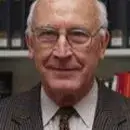
Herman Van Der Wee
Professor Herman Van Der Wee is Professor Emeritus of Social and Economic History at the University of Leuven. At the Catholic University of Louvain he progressed from the rank of lecturer (1955) to associate professor (1966), to professor (1967) and finally to full professor (1969). In the course of the decades that followed he has worked at numerous universities around the world as either a visiting professor or research fellow. He is a member of many national and international organisations, including the Royal Academy of Science, Arts and Fine Arts of Belgium, the Royal Netherlands Academy of Arts and Sciences and the British Academy. In 1986 he was elected president of the International Economic History Association. He founded the Workshop on Quantitative Economic History at the University of Louvain in 1968, which attracts graduate students and young scholars from all over the world, and promulgates new statistical, sociological and economic methodologies. Van der Wee has been honoured by the Eugene Baie Foundation (1966) and the Royal Academy of Belgium (1968), besides receiving two Fulbright-Hayes fellowships (1975 and 1981). His interests extend from the Middle Ages to the present. In 1951 Van der Wee presented a thesis entitled Outline of a method for the history of prices and wages, and then turned his attention to the economic development of Antwerp and its European hinterland during the early modern period. Out of this research grew his monumental doctoral dissertation, which was published in 1963: The Growth of the Antwerp Market and the European Economy, fourteenth-sixteenth centuries. This pioneering study is distinguished by innovative approaches to historical inquiry, metrology, monetary history, statistics, and to the analysis of economic cycles and development. After completing his dissertation, Van der Wee continued his exploration of the institutional aspects of Western European monetary and financial history and quantitative social history. In the contest of an international project surrounding the history of banking in pre-industrial Europe, he studied the role of sixteenth-century Antwerp merchants in developing new financial techniques.